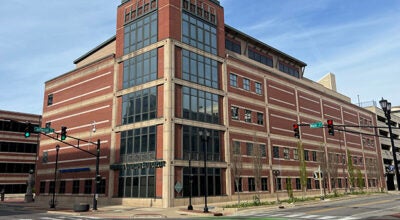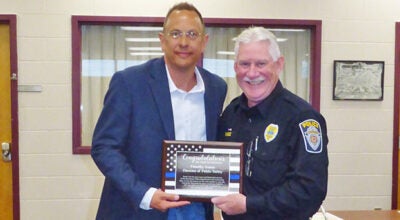SMC starting writing center
Published 9:18 pm Monday, January 10, 2011

Dr. Fred Mathews, chairman of the Board of Trustees at Southwestern Michigan College, administers the oath of office to Beth J. Cripe Monday night at the college’s regular board meeting. Cripe is a 1982 graduate of Dowagiac Union High School. She earned a bachelor of arts degree in economics from Albion College in 1986 and her master’s in business administration (MBA) from Loyola University in 1990. Cripe was appointed to fill the unexpired term of Dan Wyant, who recently resigned to become a member of Gov. Rick Snyder’s cabinet. Cripe has an impressive business background. Following her graduation from Loyola she worked in Chicago for the Chicago Board Options Exchange and Hull Trading Co. After returning to Dowagiac, she worked five years for Adept Advertising in South Bend, Ind., and bookkeeping for Judd Lumber Co. in Dowagiac. She is very active in community affairs, having served and still serves on numerous local boards and committees.
Southwestern Michigan College President Dr. David Mathews presented his annual State of the College address to SMC’s Board of Trustees during its meeting Monday night on the Dowagiac campus.
“Student academic success continues to be the top institutional priority” of SMC, Mathews said, previewing his report at noon for four reporters.
In 2010, SMC achieved its highest rankings yet.
The latest National Community College Benchmarking Project ranks SMC in the top 1 percent nationally for transfer student success.
“The benchmarking study provides objective, external confirmation of the effectiveness of SMC’s approach to teaching and learning,” said Mathews, who will also be presenting the program Thursday to Dowagiac Rotary Club.
“In addition to the success that our students achieve once they transfer, the benchmarking data also shows a truly remarkable fact: SMC’s (84 percent) success rate for students who enroll in ‘hybrid’ classes that blend face-to-face and online instruction placed the college in the 100th percentile nationally. In other words, SMC’s success in hybrid classes is literally unsurpassed nationally.”
In addition to recounting the college’s November evaluation by a four-member team from the Higher Learning Commission (HLC), as part of the re-accreditation process, Mathews announced SMC will launch this year a Center for Creative Writing in renovated instructional space that will add four classrooms to the O’Leary Building.
“This center will leverage our exceptional faculty expertise in writing instruction,” including notable author Michael Collins, “our on-campus bachelor’s degree in creative and technical writing partnership with (Ferris State University), our on-campus student housing and the college’s newspaper and literary magazine,” Mathews said, introducing Gregory DeRue, new executive director for marketing and enrollment management. “This will allow the college to market what we know to be true — that SMC is an outstanding choice for students who wish to pursue a career in writing. We have all the pieces. Just to earn an associate degree, we require two full semesters of English composition and we’ve always done that. There are many ways at a larger university that you can get by with one.”
Mathews, a consultant evaluator who has done visits to other institutions, read the following quote from the report by the team of evaluators from Illinois, Minnesota, Wyoming and Wisconsin: “All of the HLC visiting team were amazed that everyone on campus is focused on the same agenda, goals identified by the institution’s focus on student success.”
As part of the process leading up to the validation site visit, 30 college employees devoted 2 1/2 years to producing SMC’s “evidentiary document” presenting its case and amassing data for its “institutional snapshot.”
The team evaluated SMC by five criteria: mission and integrity; preparing for the future; student learning and effective teaching; acquisitions, discovery and application of knowledge; and engagement and service.
SMC received the highest possible marks in all categories, resulting in a recommendation that the college be reaccredited for 10 years, until 2020-2021. This is the maximum recommendation the team could award.
Again reading from the report, Mathews cited the team’s justification for the 10-year reaccreditation recommendation: “The team believes that Southwestern Michigan College has the fiscal and human resources to allow it to continue its service to southwestern Michigan. The commitment to serving the area and particularly the individual communities is obvious and genuine. Sound fiduciary decisions, an effective planning process linked to the budget and the dedication of the employees to student success have placed the college in an enviable position to continue to effectively serve the educational needs of the region. The team has confidence that the college will successfully continue on its current path of success.”
“They were most impressed by the fact that we have, throughout the last decade, actually not withdrawn professional development expenditures, but actually expanded conference travel, training, advanced education and on-campus in-service activities,” Mathews said.
“We always have and we always will. It’s not uncommon for us to send about a dozen people as a team to the annual innovations conference. They come back with great ideas and incorporate them. It’s paid big dividends for us. And they were impressed with the addition of dormitories, which create a collegiate atmosphere.”
The board will be deciding next year whether to build a third student housing unit.
“It is highly unusual for a college to have no commission follow-up of any sort and a 10-year reaccreditation. I’ve been on three of these visits as a team member and there has always been some level of commission follow-up. In fact, one of the evaluators confided in John Fannin when they were leaving that ‘we all arrived at the Baymont Inn on Sunday. We had all read the self-study and we had all independently come to the same conclusion — that this is a fairy tale. No college could be that good. And we were wrong.’
“That was very gratifying to us,” Mathews related. “Nonetheless, they have to put into words a justification of what they found as a team to the governing board of the Higher Learning Commission. They have to have evidence they validated in person on site, not just their own professional judgment. It couldn’t be any better from a college president’s point of view. We don’t stop trying to be the best college we can be, but we don’t for a while any longer have to put additional effort into documenting, thinking a group of visitors is going to come and question it. They’re more than impartial. They’re intentionally critical. They come with the goal of validating this.”
Mathews said SMC counts on uncertain state general funding for $6.4 million of its annual $20 million budget, down $800,000 from $7.2 million in 2001-2002 — the year he became president.
Indications are that the state general fund is going to be short by another $1.85 billion — a 20.9-percent gap.
The college for the first time took a hit of $80,000 in its $4.7 million in local millage revenue due to declining property values. “We anticipate that will continue to slide,” he said.
Tuition and fees provide $10 million of the revenue pie, “which is why our robust enrollments are a good thing,” he said. “We used to be more than 50 percent reliant on the state. Now we’re 32 percent reliant on state aid. We’ve positioned ourselves where we can demonstrate quality, with impressive student life layered on top of it like icing on a cake. We’ll continue to be a great choice for people who want a total college experience, but can’t afford the over $9,000 in tuition alone to go directly to a state university. It appears sustainable. You might be tempted to say, ‘The economy’s bad, so everybody’s flooding to community colleges,’ but that’s not true if you look across the state. The average community college enrollment increase was 2.4 percent. A number of colleges had significant declines. People are choosing to come here rather than go to some other places.”
Although he hopes state erosion will not continue, SMC’s strategy of becoming the college of first choice through quality, superior student success and student life “continues to serve us well,” the president said. “This year, SMC’s fall enrollment increase of 9.8 percent was quadruple the state average for community colleges. Overall enrollments at SMC are up more than 55 percent since 2006.”
In fall 2006, SMC enrolled 21,391 student credit hours. This past fall, that figure grew to 33,037. Winter semesters have traditionally been smaller than fall semesters.
Winter 2007 saw 18,591 student credit hours, compared to 29,132 as of last Monday, Jan. 3.
“We’re going to open at over 30,000,” Mathews said. “It’s been an extraordinary time of growth that has provided additional tuition revenue for us as we have seen decreasing state support over that period.”
“Continuous Quality Improvement (CQI) will continue to be the operating mode of Southwestern Michigan College through the coming year,” Mathews said. “In addition to always striving to find better, more efficient, more effective ways to help our students learn, three noteworthy initiatives that take place are an expansion of the student worker program, a further expansion of bachelor’s degree opportunities” and creation of the Center for Creative Writing.
Over the past year, SMC expanded and professionalized its student worker program, which last semester employed 211 students in 28 different campus departments.
“We believe that encouraging students to prepare a resume, giving them the opportunity to interview for a job on campus and giving them the ability to be supervised and evaluated by professionals is very beneficial,” he said.
These opportunities will be expanded through a $3,300 grant from First Source Foundation for winter semester, which begins Thursday.
Additionally, an endowment fund to support student workers is being established by the Cliff Poehlman family of Cassopolis with a $48,000 donation.
SMC offers eight bachelor’s degrees (and 26 certificates) through partnerships with four-year colleges and universities.
During the coming year, SMC will continue to work to expand bachelor’s degree opportunities, both through partnerships with other institutions and by pursing degree-granting authority for its own bachelor of science in nursing (BSN) program.
Legislation authorizing community college to offer this degree passed the Michigan House of Representatives by one vote late last year, but was not taken up by the Senate before the end of the session.
SMC is working with the new Legislature and other state officials to gain this authorization during 2011.
Mathews said new additions to the college include: Nick Mustak, coordinator of institutional research; Shawn Rawson, from part-time to fulltime coordinator of the Student Activities Center (SAC); and Whitney Munger, a former student who returned as an outreach specialist.
Next month SMC will be announcing four new associate degree programs and one new certificate.
“There has never been a time before in the history of the college,” Mathew stated, “when so many people are looking to SMC for their chance at a better life. As I told our employees, ‘This is really an exciting time to be part of Southwestern Michigan College.’ ”






